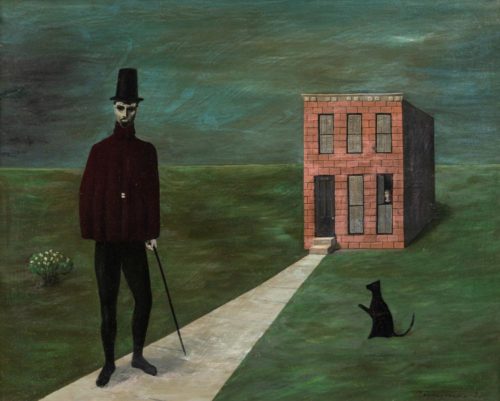
Qin Feng
“Fascism may be defined as a form of political behavior marked by obsessive preoccupation with community decline, humiliation, or victim-hood, and by compensatory cults of unity, energy, and purity, in which a mass-based party of committed nationalist militants, working in uneasy but effective collaboration with traditional elite groups, abandons democratic liberties and pursues with redemptive violence, and without ethical or legal restraints, goals of internal cleansing and external expansion.”
R.O. Paxton (The Anatomy of Fascism)
“0, what a goodly outside Falsehood hath!”
William Shakespeare (Merchant of Venice)
“Fania Pascal recounts an episode in which Ludwig Wittgenstein, picking up a volume of Grimm’s fairy tales, reads out with awe in his voice: ‘Ach, wie gut ist dass niemand weiss | Dass ich Rumpelstilzchen heiss.’ [Oh, how good it is that nobody knows | That I am called Rumpelstiltskin] ‘Profound. Profound,’ he said.”
Sarath Jakka (Nothing Beyond the Name)
“The vague feeling that there has been a rapid invasion which has forced people to lead their lives in an entirely different way is now widespread; but this is experienced rather like some inexplicable change in the climate, or in some other natural equilibrium, a change faced with which ignorance knows only that it has nothing to say. What is more, many see it as a civilizing invasion, as something inevitable, and even want to collaborate. Such people would rather not know the precise purpose of this conquest, and how it is advancing.”
Guy Debord (Comments on the Society of the Spectacle)
Debord wrote the above in the 1980s. A few paragraphs later he adds: “This has nothing to do with the perfecting of its media instruments, which had already reached a highly advanced stage of development; it means quite simply that the spectacle’s domination has succeeded in raising a whole generation molded to its laws.”
So we can add on two generations more, or perhaps three, depending on how you look at it. The Covid lockdowns served as a sort of catalyst to consolidate the existing multiple threads of influence. The lockdowns concentrated the ennui that had been creeping into western social relations for thirty some years. I was out this last Saturday night. In a city of a half a million people. It was the first sunny warm weather this year in Norway, so nearly everyone was outside, wanting to enjoy the weather. And yet, because most restaurants use an app and ask people to reserve ahead of time for dinner, there was no chance of just spontaneously deciding on a place to dine. The problem was exacerbated by how many restaurants had shuttered their doors due to the Covid protocols. Spontaneity is a casualty of the new regimen for Western society. What Debord described as a vague feeling that something has changed in the quality of life for most people, at least in the West, is now much less vague. It is, in fact, glaringly obvious (well, to some) and increasingly disturbing. The so called *mental health crisis* is directly related to the uncontrolled anxiety that comes with this destabilising experience of daily life. Even the most ordinary of activities has taken on a quality of unreality. Life is just out of reach, today. I think it is less clear to people now what constitutes the now and what is memory. The manufacturing of reality, courtesy of Western media, is further and further from nearly everyone’s actual reality, although what one means by reality is partly the topic of this post.

Allan D’Arcangelo
The professional class, doctors, lawyers, scientists of all types, are captured and compromised. Professional standing is threatened if one speaks out. If one challenges, say, the official narrative on sun screen use, for example, you will be viewed as a crank. A sun screen denier. You cannot find a search engine that will provide anything except paid for *sponsored* links that trumpet the benefits of slathering chemicals on your or your child’s body. The sun once viewed as a life giving source of heat and health, is today another threat that pharmaceuticals must protect against. There are countless examples, however. Meat is bad, crickets are good. Solar panels are green, no, wait, solar panels are not green. Electric cars…no wait. Etc.
“In one way the neuroses show a striking and far-reaching correspondence with the great social productions of art, religion and philosophy, while again they seem like distortions of them. ‘We may say that hysteria is a caricature of an artistic creation, a compulsion neurosis, a caricature of a religion, and a paranoiac delusion, a caricature of a philosophic system. In the last analysis this deviation goes back to the fact that the neuroses are asocial formations; they seek to accomplish by private means what arose in society through collective labour…Genetically the asocial nature of the neurosis springs from its original tendency to flee from a dissatisfying reality to a more pleasurable world of phantasy. This real world which neurotics shun is dominated by the society of human beings and by the institutions created by them; the estrangement from reality is at the same time a withdrawal from human companionship.”
Sigmund Freud (Totem and Taboo)
My own feeling, reflected, I suppose, in this blog, is that language plays a vastly more important role in the current madness than is usually believed. And by extension, language in its relationship and its employment in art. In the imagination. When I write of the importance of allegory or symbol, or parable, I am being quite literal. The evolution of social relations is one in which facsimile relationships replace real ones. The most obvious issue is seen with on-screen learning. Zoom education and Zoom conferences as well.

Charles Prendergast (Rising Sun, 1912)
“By allegory I mean something the natives have no reason to repress, such as the snake representing rain, clouds, water. The use of symbols as allegories is thus an indicator of man’s unconscious in relation to environment. The first aim attained is therefore to project an internal strain, but the second function is to minimize environmental dangers by equating them with infantile situations, with dangers that were dangers only in the past.”
Geza Roheim (The Eternal Ones of the Dream)
“Let us suppose then that the proper analogue to allegory is the compulsive syndrome, which Freud himself had made parallel to religious behavior. One condition must be laid down: that we are not talking about the compulsive behavior of authors as men; we are talking about literary products which have this form, a form we can discern regardless of its causes, a form which for our purposes exists as a thing in itself.”
Angus Fletcher (Allegory)
There is a quality of the compulsive in the new ascendent scientism one sees best personified in computer modeling.
“The highly ordered sequence of events in the typical fable likewise has at first a deceptive, seemingly scientific order. Yet, as Fenichel observes, ‘Compulsive systematizing, performed not for the purpose of mastering reality, but rather in order to deny certain aspects of it, falsifying reality, is a caricature of science’.”
Angus Fletcher (Ibid)
But it is not just falsifying reality, or rather it is not intentionally believed to be an act of falsification. As Fletcher notes, *virtue*, the purpose of moral allegory, is really about power. The moral allegory was ostensibly about Christian grace, but operated in a dynamic of strength and weakness, certainty and doubt. And allegory always carries with it a degree of ambivalence. And it is useful to consider the qualities of prophecy and of oracles in medieval literature, and its evolution in the works of Kafka, most obviously, when considering the qualities of thought that have been erased in contemporary discourse.

Lucas Samaras
One of the qualities of contemporary science, or at least the popular form it takes in media, is the hygenic and anodyne. There is a partly hidden moral allegory at work, where anything that cannot be made for measurement is simply discarded. And anything of uncertain cleanliness be either removed or disinfected. And such purifying is a kind of risk reduction.
“If, however, we are to find adequate formal criteria in psychoanalysis, we shall need especially to examine the neuroses as patterns of behavior. The neuroses are typical shapings of unbalanced behavior for which it is in fact possible to find cultural analogues, since each neurosis is very like a creative, positive, civilizing ‘symbolic action’.”
Angus Fletcher (Ibid)
This is a significant observation. Neurosis are patterns of behavior. And they have this crypto Puritanical aspect. And here the question is begged ‘what’ is the ideal against which such civilizing action is operating?
“Genetically the asocial nature of the neurosis springs from its original tendency to flee from a dissatisfying reality to a more pleasurable world of phantasy.”
Sigmund Freud (Ibid)
That today science has seen fit to manufacture Chatbox AI suggests a very dark tendency indeed. The advertising for chatbox apps says that they mimic human conversation, primarily online. But what does that mean, exactly? Mimesis is a hugely complicated concept. And there are different approaches to it, from Adorno to Girard. And to Freud. Now before going into that, I wanted to note a few more things on the pathology hidden in the compulsive. Fenichel observed that compulsive thought was general, not specific. It is directed toward systematization and categorization, and it is abstract. He noted the compulsive prefers illustrations and maps to the real thing. And the compulsive, regardless of his or her intellect, carries within the residue of archaic traits, of magic and superstition. Today there has developed a culture of compulsivity. And computer modeling is the embodiment of this cultic embrace of the abstract.

Wang Guangle
Fletcher notes that the marriage of logic and superstition in the tendency toward oracular beliefs, and, interestingly that often there is a double (the mirror in Merlin for example). And the role of the double has profound implications in this context. The ubiquity of computer modeling means there is a disproportionate influence exerted by the compulsive qualities of this practice. The archaic presents, in computer modeling, as a kind of magical set of rites or rituals attached to the model — it is also perilously close to the magical aspect of *naming*.
“Consulting an oracle, in principle, means either forcing permission or forgiveness for something ordinarily prohibited or an attempt to shift the responsibility for the things about which one feels guilty onto God. The oracle is asked for a divine permission, which may act as a counterweight against conscience.”
Otto Fenichel (Psychoanalytic Theory)
The computer model is the oracle, after the fact. The role of expert is linked to this, as well. And code is actually a rather pure form of *name* magic.
“The creation of this replica of the real world makes it possible to calculate and act out in advance in this ‘model world’ before real action is taken …. Words and worded concepts are shadows of things { } He who knows a word for a thing, masters the thing. This is the core of the “magic of names,” which plays such an important part in magic in general. It is represented in the old fairy tale of Rumpelstilzchen, in which the demon loses his power once his name is known.”
Otto Fenichel (Ibid)
Code brings order to the outer world. And it is oracular, secret. It’s meaning known only to initiates. It is also quintessential reductionism. The alchemist of code is using only two ingredients.

Merry Alpern, photography.
“The complement of creating worlds by magic is the “wishing away” of an undesired piece of the world, the strange ability to deny reality at the point where it opposes the patient’s wishes. A true loss of capacity for testing reality is a characteristic feature of psychoses. In neuroses, the typical “turning away from reality” is “introversion,” a turning away from real objects toward the images of infantile objects. In this respect, the compulsion neurotic, because of his “omnipotence,” stands a step nearer to psychosis than does the hysteric.”
Otto Fenichel (Ibid)
But the contemporary compulsive is not testing reality. He or she does not know what constitutes reality. The computer analyst is writing code and testing models as a way to create a world (which is not quite the same as reality) that can then be managed. The model is, actually, already invented via the creation of algorithms and the choice of input parameters etc. Both event simulation or queuing theory models, the results are already surmised to a large degree. The code writer is God as a systems manager. Freud called compulsion neurosis a private religion. And this idea of privacy and hiddenness is heightened by the technology of surveillance today. Three generations (or more) trained in the ideal image of technological superiority. That civilizing mission of advanced capitalism. There is no such thing as privacy, a leading technocrat has said. Except that there is, but it is a secret privacy. Almost like hiddenness is hidden now.

Liu Kuo Sung
Guy Debord (Ibid)
An actor can become president, a lawyer a police spy, a man can become a woman.
Weapons, said Jens Stoltenberg recently, are the only path to peace. The madness spirals out further and further from the individual psychotic. But I digress. The point, regards the invasion of this vague but incessant discomfort that almost everyone feels, is that it did not start last week, nor when the WHO declared a global pandemic, and it did not start, even, with the Club of Rome or the Rockefeller family. But it did start, in its current form, sometime after WW2, I think. It grew, in its current form, in the 1980s. Post Vietnam. The seeds though, have been in circulation since the late 1800s.
“Spectacular domination’s first priority was to eradicate historical knowledge in general; beginning with just about all rational information and commentary on the most recent past. The evidence for this is so glaring it hardly needs further explanation. With consummate skill the spectacle organizes ignorance of what is about to happen and, immediately afterwards, the forgetting of whatever has nonetheless been understood. The more important something is, the more it is hidden.”
Guy Debord (Ibid)

Flor Garduno, photography.
I want to digress just a moment. Like all digressions it’s not really a digression. Maybe there is no such thing as a digression. Never mind. Fenichel notes in a chapter on addictions that compulsive habituations can be found with a psychic architecture much like heroin addicts.
“A patient with no capacity for waiting had obsessively to carry books with him in order to be able to read at any free second; he had to avoid being alone with himself. The book in his pocket gave him the same reassurance that morphine in the pocket gives to the drug addict.”
Otto Fenichel (Ibid)
This is something I have often done. In fact I used to carry large leather shoulder bags (Ok, I still do) filled with books. And somewhere in my brain I had said, oh, if I’m stranded I have something to do, I can read. But what strikes me about this is its relationship to the imagined future. I often will not wear a new shirt (OK, in my case a new T shirt) for months and months, keeping it for the right occasion. I have almost ZERO special occasions of the sort imagined. But this bit of neurotic hoarding, on my part, is also tied into the same future where I am stranded and need something to read. There is also a link here to counter-phobic tendencies. A person, denying his or her anxiety, will unconsciously seek out situations that are those of the original phobia. (I think I have an aspect of this in me, as well). This is relevant here because of the relationship to love and affection and the fetishized nature of love in/under capitalism. The compulsive need for attention or to be worshiped, especially erotically, is highly instrumental. This ego cannot receive love, but demands it be given.

Etching of a maze from guidebook about the Oude Doolhof, ca. 1648 (Public Domain Review)
“The patients try to re-enact in “play” the dangers they fear, and thereby learn to master them. But frequently it happens that the game turns into the “real thing” and the danger they tried to control overwhelms them.”
Otto Fenichel (Ibid)
Under advanced capitalism, or the current phase of what Beller called *computational capitalism*, these structural disorders or compulsions are mediated by the ubiquity of screens. Allow me to stay with Fenichel just a bit longer here…
“A patient felt well only as long as he knew what “role” he was supposed to “play.” When at work he thought, “I am a worker,” and this gave him the necessary security; when at home, “Now I am the husband who comes home from work to his beloved family.”
Otto Fenichel (Ibid)
These compulsive structures form an ‘ego-syntonic’ ritual that has to be followed. The work role becomes robotic, for example. The feelings sought, when realized, remain cold. And this is the key ‘take away’ here…
“The object relationships of compulsive characters are characterized by their anal-sadistic nature. They are ambivalent and filled with assurances (often inadequate) against aggressiveness. Frequently all object relationships are characterized by the conceptions of “possession” and “presents.”
Otto Fenichel (Ibid)
If we examine the expressions of virtue signalling (sic) during the pandemic, the mask wearing for example, one sees the anal sadistic in stark relief. This is tied into scapegoating. It is an aspect of lynch mob thinking. The narcissistic fixation supplants real emotions. The counter-phobic in such cases is reactive (probably usually anyway) and requires the individual to regress to primary omnipotence. One sees this often in social media, I think. The sense of self importance in those demanding the correct pronouns or vaccine adherence. Those who violate the rules are not risking societal collapse but are risking the mental collapse of the individual doing the policing, hence the extreme hysteria. You see this is much of the climate protesting, which invariably means privileged white bourgeois youth who, interestingly perhaps, seek out museums and work like that of Manet or Rembrandt that may be experienced as accusatory. Throwing paint on Manet or gluing oneself to Goya feels infantile, and it also suggests infants playing with feces.

Feng Zhengjie
But I want to return to this marketing, again, of AI and of science in general. And this returns the discussion to allegory, I think. And Fletcher has a very telling footnote on Thucydides…
“Thucydides,provides the first major discussion of newspeak in Western history. Describing the revolution in Corcyra, Thucydides shows that “the limit of power, operating through greed and through personal ambition,” created a new linguistic climate in which language itself was corrupted, as by a plague, the same plague which is a synecdoche, or perhaps a metonymy, for all the ills of the Peloponnesian war. Such was the inauguration of the Big Lie.”
Then he quotes Thucydides….
“So revolutions broke out in city after city …. To fit in with the change of events, words, too, had to change their usual meanings. What used to be described as a thoughtless act of aggression was now regarded as the courage one would expect to find in a party member; to think of the future and wait was merely another way of saying one was a coward; any idea of moderation was just an attempt to disguise one’s unmanly character; ability to understand a question from all sides meant that one was totally unfitted for action. Fanatical enthusiasm was the mark of a real man, and to plot against an enemy behind his back was perfectly legitimate self-defence …. These parties were not formed to enjoy the benefits of the established laws, but to acquire power by overthrowing the existing regime; and the members of these parties felt confidence in each other not because of any fellowship in a religious communion, but because they were partners in crime. If an opponent made a reasonable speech, the party in power, so far from giving it a generous reception, took every precaution to see that it had no practical effect.”
Thucydides (The Peloponnesian War)
And in turn this discussion of compulsion leads back to Freud, and to the Death Drive. Freud was from his earliest work concerned with *mastery*. The tendency, psychically, to master excitations. In 1920 Freud introduced the idea of the Death Drive, a concept that has since met with acute suspicion. The unfathomable beginnings of life cannot but be speculated upon, but life did begin at some point, the organic came out of the inorganic. And Freud suggested that at this moment there arose a tension in this new inorganic matter. He wrote that ‘decisive external influences’ acted upon the inorganic. Take that as you will.

Arthur Rothstein, photography.
“Freud summarizes this first hypothesis with the conclusion that the “guardians of life” were originally “the myrmidons of death”. Although this possibility is immediately rejected, an element of truth is buried in this first “extreme view,” which I will return to shortly. The second hypothesis, which is promptly affirmed, is that certain “germ-cells” of primitive organisms “retain the original structure of living matter and, after a certain time, with their full complement of inherited and freshly acquired instinctual dispositions, separate themselves from the organism as a whole”.
Benjamin Y Fong (Death and Mastery)
Freud posited that the organism acquires a shell, or shield: its outermost surface ceases to behave as living matter but becomes to some degree inorganic. How metaphoric this is shell remains open for debate. It is a strange formulation that is saying, really, that the death drive is helping ward off the death drive. In any event, as Fong notes, Freud could not supply a reason for this happening. What is so threatening in this primordial ‘outside’ world? The answer, for Freud, was essentially over stimulation. An idea that would resurface throughout his subsequent work.
“This situation, where the very same force can be seen as both one of homecoming and one of destruction, is characterized by a primal ambivalence.”
Benjamin Y Fong (Ibid)
The world is thus made into an *external* world. This is a profound observation of Fong’s.
“The death drive in its former capacity as protective shield builder is what “binds” the free-flowing energy that rushes through the traumatic breach by means of “anticathexis” into a dead, cortical layer; in other words, in this role, it operates as the drive to mastery. In turning against itself in this way, the death drive (what might be called a drive to “self”-mastery, i.e., mastery of the tension of organic matter) is redirected outward into a drive to “other”-mastery (mastery of the tension caused by “external” impingement).”
Benjamin Y Fong (Ibid)
This is not saying that ‘I want to annihilate myself’ becomes ‘I want to annihilate others’ but rather ‘others want to annihilate me’. What is important here is the picture formed, the schematic of inside and outside, of inner and outer worlds. Of I and they. Also, the later conflation (courtesy of Melanie Klein mostly) of aggression with the Death Drive is not what Freud was suggesting. The other idea of importance here is that *ambivalence*. For this has always been an idea that makes psychoanalysis slightly uncomfortable.

Paul Wonner.
“In other words, although the drive to mastery emerges initially as a protective drive in relation to a hostile environment, it is also the condition of the possibility of receptivity to the outer world (and, in theory, it continues to be so after the “paranoid” relation to the world is overcome).”
Benjamin Y Fong (Ibid)
The death drive then is the force for differentiation. And here, for our purposes, we fast forward to the Frankfurt School, and Fong’s reconstruction of their critique of the Enlightenment. For much as I weary at times of writing on the Enlightenment, it seems one is unable to avoid it.
“Odysseus demonstrates the basic maneuver from which the subject emerges. As with Freud’s living vesicle in ‘Beyond the Pleasure Principle’, the subject is born—or, rather, is able to survive as more than a temporary blip in the chaos of existence—by paradoxically submitting to a kind of self-deadening in order to live. Hegel had a very good term for this capacity, which inaugurates Western subjectivity: the cunning of reason.”
Benjamin Y Fong (Ibid)
“Everything—including the individual human being, not to mention the animal—becomes a repeatable, replaceable process, a mere example of the conceptual models of the system.”
Adorno and Horkheimer (Dialectic of Enlightenment)
The figure of Odysseus is the lone voyager(as Fong puts it) and ideologically is already homooeconomicus. Fong’s take is interesting, and his perspective on outside and inside, subjectively, makes a certain sense. Capitalism intercedes to rob the subject of an outside that is not already regulated. Humans are then, as Marx said and Fong quotes, simply agents of economic forces.
“Like the owl of Minerva, Freud theorized the psychic dynamics of the bourgeois subject at a time when it was already beginning to disintegrate. Under the spell of the culture industry, the tensions that held together the bourgeois psyche begin to unravel and a new form of maintaining psychic stability is established. For this reason, late capitalism is defined not only by a reorganization of production, radically heightened capacities of distribution, and a new ideology of consumption but also by a sea change in what Judith Butler calls “the psychic life of power.”
Benjamin Y Fong (Ibid)

Caravaggio (Sacrifice of Isaac, 1602)
Fong spends much time on Jessica Benjamin’s critique of Adorno and the Frankfurt School. I will only say that Benjamin is not worth the time. And is weirdly misguided in her assault on Adorno and Horkheimer (mostly). But the relevance here is that Dialectic of Enlightenment presciently saw the deterioration of mental health in the West. Whatever one might mean by health. And the hostility to Adorno mirrors that directed at Freud and Marx, both. And pondering the reasons for these hostilities is probably paramount.
“The proliferation of screens has made us terrified to disappear, not to be “liked”, not to be “followed”. We have all become victims of the virtual self and its glamour and its fear of missing out and fear of disappearing. Everything seems governed by this hyperreal dream of narcissistic self-promotion and its imminent failure as it sucks the life out of us with its demand for our continuous attention ‒ the person stopped on the pavement or in the road staring at their screen.”
Rob Weatherill (Lacan in End Times)
Now, Weatherill is a problematic thinker in many respects but also a deeply insightful one much of the time. And here is describes almost exactly what Debord suggested in that quote that began this post.
“We may not die from some external catastrophe but from banality, the banality of simulated seriousness or virtue signalling. Not being able to speak in any way about deep things, with no adequate language, and not even being at all aware of the loss of depth.”
Rob Weatherill (Ibid)
There IS an experience of this loss of depth. That is this fugitive feeling of invasion. But there is no language to conceptualize it, and while there is an experience there is often no trust in that experience. Much of society has lost the ability to trust their interior lives. And experience is constantly mediated by marketing, and often a marketing that promises a reduction of experience (non fat milk, 3D printed meat etc). Now there is a sort of side bar, one that Bly noted, too, and that is the loss of fathers. And this becomes too vast a topic for this post, though I think it may well be the subject of a later one. But the point here is that, as Lacan observed, the father is “the narrow footbridge thanks to which the subject does not feel directly invaded, directly swallowed up by the yawning chasm that opens up as pure and simple confrontation with the anguish of death”.
Jacques Lacan (Seminar)

Gustave Moreau (Oedipus and the Sphinx, 1864) detail.
Weatherill employs this quote from Lacan. Note that image of invasion, again. Freud noted the importance of protection by the Father. There seems an almost instinctual desire for an admirable authority, at least in early childhood. The staggering number of fatherless homes in western societies today is often overlooked. (the latest statistic for the U.S. has over 25% of children growing up without a father at home). But in these anti-Freudian times, and anti-Oedipal times, the father is, at most, myth. Or perhaps ideology.
“Family was at the heart of social capital. Collapse of the family hits hardest in the poorest third of the society. There are fewer adults looking out for children, fewer coaches paying attention to kids, fewer neighbours, and a loss of a shared sense of social responsibility for the rearing of children.”
Rob Weatherill (Ibid)
But here, one might remember Adorno’s comment, the ‘whole is untrue’. Under capitalism the class struggle became paralysed, and sclerotic. The destruction of community preceded today’s hyper reified social relations. Weatherill notes David Fraser’s statistic that there are 15 times more violent acts in the U.K. than in the 1950s. There are that many more single parent families in the UK now, too. It is impossible to posit causation here, really, but if the Father is mere myth, a castrated myth at that, then something of that sense of early protection has disappeared. And the current great reset movement is one that reinforces the idea of humanity as a blight on the earth. People are afraid of other people and birth rates are plummeting.
“By the middle of the twentieth century in Europe and North America a massive change had taken place: the father was working, but the son could not see him working.”
Robert Bly (Iron John: A Book About Men)

Bertien van Manen, photography.
The father is hidden, in a sense. The father may not be absent, but he IS mere myth, literally. The basic differentiation of inside and outside developed, even if only as myth, as ‘they are trying to murder me’.
The loss of literature has had and is having a profoundly detrimental effect on humanity. It is not that few read the classics, it is that close to nobody reads them. Critics like Fletcher or Moretti, or Frank Kermode or Hugh Kenner or even Leavis, Empson, Auerbach, and Calasso — such writing no longer exists. Readers of such critics have dwindled to something like single digits. It is often hard to explain why a study of Milton or Dante is so absolutely crucial. The authority of an Empson, or Moretti, is itself a kind of fathering. I am 72 tomorrow, June 18th, and I still find in Angus Fletcher (or Marx, or Adorno, or Bly, etc) a renewed sense of a Father.
“The exclusionary conditions such as ‘nothing-but-psychiatric drugs might be legally permitted’ or ‘nothing-but-empirical evidence might guide an expert diagnosis’, while not being stated in such stark terms, visit those seeking relief from mental health services with stark regularity. Therapists belonging to different disciplines recognize these ravages of naming and have to work out idiosyncratic strategies for a listening that avoids the glare of disciplinary projects. The ravages of naming are especially seen in the pressure to arrive at a quick diagnosis. In a chapter titled ‘Avoid Diagnosis (Except for Insurance Companies)’, Irvin Yalom notes the current over-emphasis on diagnostic efficiency, in which ‘managed-care administrators demand that therapists arrive quickly at a precise diagnosis and then proceed upon a course of brief, focused therapy that matches that particular diagnosis’.”
Sarath Jakka (Ibid)
Now I know several very good therapists, committed and people who have done enormous good. But they exist as anomalies today. And the takeover of treatment by pharma aligns with the acute alienation that comes from scientism, a scientism that is utterly synonymous with capitalism.

William Balthazar Rose
“The precious advantage which the spectacle has acquired through the outlawing of history, from having driven the recent past into hiding, and from having made everyone forget the spirit of history within society, is above all the ability to cover its own tracks — to conceal the very progress of its recent world conquest. Its power already seems familiar, as if it had always been there. All usurpers have shared this aim: to make us forget that they have only just arrived.”
Guy Debord (Ibid)
The above quote is exactly what is happening through western cultural colonising, a process that is able to hide or at least neutralize the effects of unprecedented inequality. The fact that laws and policy are now nakedly in the interest of the 1% seems to be, often anyway, ignored. And if not ignored, such grotesque privilege for a very few does not seem to catalyse any kind of righteous anger. In fact, the marketing of *anger* as a bad thing has been part of the ruling class mission over the last forty years. Anger is immature. Anger is low class (!!!). Anger is so vulgar. Etc. Even if many, for example, believe the Covid protocols were unnecessary and lethal, that they destroyed millions of lives, there seems an inability in many (not all) to feel anger. ‘They are trying to murder me’ has become ‘it seems they are trying to murder me, but I don’t quite know, and I don’t want to make a scene anyway’. The political/electoral representatives (in the West, meaning US, Canada, and the EU for the most part) are the product of what Debord describes. They not only help erase history, they grew up themselves without history. Look at the presidents, prime ministers and high office holders in the EU. The most striking common trait they share is that they are children. Lost frightened children. But malign sick children as well. Mark Rutte, or Sunak, or DeCroo, or Macron — let alone Meloni in Italy, a sort of ideological male. Ideologically masculine. And for many, in countries like Norway or Sweden or the UK (but also a half dozen others, from Austria to the Netherlands and beyond) these leaders, mostly men, are acutely immature, they are suffering a masculine crisis that allows them shameless groveling at the tables of their masters. It is fascinating to see Joe Biden, infirm, clearly suffering dementia, held up as a great world leader. The Emperor’s New Clothes. Infirm or children, that is the choice. Trump can barely speak coherently anymore, if he ever could, really. His vocabulary seems literally at a third grade level. But his poll numbers remain high. The recent statements from Sweden’s Mikael Tofvesson, the ‘operational manager’ of something called The Agency for Psychological Defense are very telling. He speaks of how he was proudly helping Ukraine in its psychological readiness for the US war on Russia. This meek little man, pleading for approval from his big brothers in the US, is filmed primarily at his computer keyboard. (here is the link, and one doesn’t need to understand Swedish to appreciate https://www.svt.se/nyheter/inrikes/svensk-myndighet-pa-plats-i-ukraina-bidrar-i-informationskrig-mot-ryssland
“While Freud is sanguine and stoical, it is clear that this orientation sees the death drive as entirely connected to severe mental illness, not least the perversions of the superego which enjoys suffering (of the melancholic, the obsessional), so much so that the more you obey it and cede to its demands, the more you feel guilty. Nowhere is this clearer today than with the increasing demand to be politically correct: the more you conform the more you have to virtue signal as the new evolving superego clings onto you.”
Rob Weatherill (Ibid)
But severe mental illness is now the norm. Those who can see it, are coerced into silence. A few cry out.

Gertrude Abercrombie (The Mysterious Stranger, 1953)
“Modern biological findings show that cells, on their own and isolated, die for want of signals from their neighbours to keep them alive’. In ordinary tissues, cells are kept alive by (chemical) communication. Communication is key; thus, contra Lacan, object relations are key. However, all cells are genetically programmed to die under some circumstances, particularly cells that are isolated. This is termed “apoptosis”. Thus, ‘Protista and cancers cells are immortal ‒ they have lost the ability to die, but their very “aliveness” is death bearing’.”
Rob Weatherill (Ibid)
The Enlightenment legacy then is that which corrected Church dogma at the expense of human connectivity. Human communication. It sacrificed allegory and the cosmic and Pagan. Reason became a form of unreason, but masquarading as super-reason. And science, the crowning jewel of Enlightenment progress almost immediately became something psychoanalytically malignant.
“In the passage I have just quoted, Enlightenment works against the first form of mimesis—“the childishness of children”—by “hardening the ego against such behavior,” and it is an overarching theme of the work of the Frankfurt school as a whole that it works against the second by replacing self-reflective reason, “Reason” in the broad sense as it is understood in Horkheimer’s *Eclipse of Reason*, with instrumental reason. Even a hardened instrumentalism, however, is a kind of mimesis, a mimesis ‘of death. The subjective mind which disintegrates the spiritualization of nature masters spiritless nature only by imitating its rigidity.’ In other words, the subject mimics the deadening imposed on the world by its own struggle for survival. Since, however, it is imitating its own projection, this “mimesis of death” is an antimimetic mimesis, an expression of mimesis that generates narcissism, insulating the subject further and further from any real encounter with the object.”
Benjamin Y Fong (Ibid)

Joseph Hugh Ward (Detective Novel book cover. 1939)
Children want to be the object they experience. Mimesis. The admirable authority of the Father (or family) allows for this, but only up to a point. And today, the post oedipal family is often an anti-family. The Enlightenment created a regulated (and domesticated, per Fong) ‘outside’ as protection against the real material ‘outside’. Throughout the work of Adorno and Hans Loewald, and in Lacan, too, and Norman O. Brown, the ‘ego’ is described as rigid, weak, inflexible, and brittle. The Ego atrophied, and the body became robotic. That contemporary AI seems so obsessed with creating robots that resembles humans, one cannot but help see an unconscious projection. The stiff mechanical man is a better man. The man without feelings. The lone emotionally distant Western gunslinger anticipated this to a degree, but these types overlap. But there is something else that has occurred more recently, too. Those critics in the 1940s and 50s, like Adorno and Horkheimer and Ernst Bloch and Benjamin, they saw film and TV product reinforcing sameness, conformity and regularity. The identification with the ‘other’ in the form of a moving image was very powerful. But this has shifted over the last twenty years, and the identification is with something, or more, ‘someone’ missing. The hyperreal Baudrillard posited is now everything, and identification for the atrophied ego nearly impossible. The urge to identify (here in the context of mimesis) is interrupted. Truncated. Repressed. Something has gone away, out of sight. Replaced, yes, with other images. But there is an archaic desire, or instinct, for that which is authentic in some sense. For the admirable authority, perhaps. For protection. And it cannot be found.
“The inevitable outcome of most mass-mediated fairy tales is a happy reconfirmation of the system which produces them.”
Jack Zipes (The Instrumentalization of Fantasy: Fairy Tales and the Mass Media)
But this desire for ‘escape’ in mass culture is, on a deeper (or at least other) level, the desire to escape from alienated labor, from crappy underpaid jobs and mortgages and unhappy marriages. From economic precarity. Still, the desire or instinct for identification is also stunted because the self has gone missing. Or certainty of self. The fragile sense of self has a hard time, today, in organizing itself enough to *desire* something. Unless it is directly in front of it, this fragile self cannot emotionally pursue it.
“Indeed, the problem is not that subjects have become divorced from reality or incapable of judging, deciding, and calculating, but that reality has become static, rigidly “one way,” and that the subject’s judgments and decisions are themselves not judged and assessed, only applied. It is thus not that society “generates illusions and distortions, presenting a façade that is actively misleading,” but rather that it generates a remarkably stubborn adherence to the status quo.”
Benjamin Y Fong (Ibid)
This is the basement floor in this discussion. The invasion of this subtle and troubling feeling of being appropriated without quite knowing it is part of the manufacturing of a remarkably durable ‘reality’ without qualities. It is a world of narratives without allegorical dimension. It is largely a world of markedly abbreviated narratives. It is a world without others in a very real sense. The screen world does not provide allegory. The third generation of screen raised compulsive does not have a history of allegorical meaning. Those manufacturing the screen product do not have a history of allegory, either. Society is not reaching a technological singularity, but a famine of meaning. Nothing means anything anymore. The Imperialist President of a literal Empire is not able to walk across a stage without becoming confused. Fletcher notes moral allegory is about power. There is no allegory, only unhinged power. And the clients of power perform roles in this pantomimes of class burlesque. Macron, BoJo, Netanyahu, and they salivate in the presence of a Bill Gates or Elon Musk. There is nothing to say about Gates. He is a nasty little pervert, sure, you could say that. But on a grander scale he is the man without qualities. And he lives in a world that loses more meaning every nano second that passes.
To donate to this blog and to the Aesthetic Resistance podcasts, use the paypal button at the top of the page.
https://soundcloud.com/aestheticresistance/podcast-87

Thank you for the image of walking anywhere and everywhere with books. Of course that reminded me of seeing Robert Bly around town when I was growing up. One indelible image is seeing him with at least 3 thick hardcover books when he was out at the local u-pick strawberry farm. He took the books out in the fields with him and apparently could read and pick strawberries at the same time. Interestingly, the farm was owned by a curious fellow who had a PhD in math from Berkeley but decided he didn’t want an academic career. Besides running the strawberry farm he also did projects like translate and stage a production of the Kalevala. I was thinking about him and people like Bly because I met up with one of my favorite people in the place I now live, this 70-something lawyer who always tells you exactly what he thinks and has stories for days. It is so refreshing to be around people like him because in my business I interact with so many different people everyday but so rarely meet anyone who is alert and with an active mind (the ones who do are the “uneducated” at the margins of society). But I also feel that even just 4-6 years ago I used to have much more interesting and lively conversations with people, I see new people everyday in my business and in so many cases basic cognition is not present. There is truly no one home. So when I meet someone who actually has a spark I am so grateful. I could be wrong but I feel that just a few years ago more people had a spark.
I was nearly killed last week. Quite literally. But I’m mentioning this because of the way I was treated at the hospital. I was “roofied” at a bar (busy, fun, convivial place that I frequent and where you can have fun random conversations with a wide range of people) — whatever drug it was it was extremely fast acting and left me functionally Biden. There’s a two hour period that is blank — the police found me face down on the sidewalk dead to the world (I have zero recollection of the officer or how he transported me to the hospital).
When I regained consciousness, four people in scrubs were looking down at me and told me I needed to be put in one of their scanners to see if I had brain damage. I was bewildered because I didn’t know why I was there or how I got there and since the drug had worn off mostly I was getting back to my normal self at least mentally. They said I had no choice but to do what I was told under something called the Marchman Act in Florida. This is the second time I have been admitted to a hospital in the last 20 years — the other time I was also roofied. I haven’t done any western medicine since my early 20’s and haven’t taken any vaccines since the ones required for college.
This resident who was the main one talking to me was out of his depth when I told him I didn’t do western medicine and had no medical records or doctor to list. It got a little heated when I tried to tell him that this was not alcohol-related. At 46 I know myself enough that alcohol would not have caused me to act like Biden. And I had had the prior experience. They wouldn’t even entertain my suspicions and after that point treated me like I was some lunatic. They left the room after I started listing all the friends and relatives I know who died from medical professionals, hospital malpractice, and the 4 people I know killed by the c-jabs. They wouldn’t engage me in conversation and didn’t take my own knowledge seriously. So I kept asking why they wouldn’t let me go and get some sleep at home because they weren’t doing anything except “monitoring my vitals”.
I had never been to the hospital or seen a doctor in the 8 years I’ve lived in this city and after going through all the nonsense from the last few years meeting these “health professionals” under those circumstances reinforced my extremely dim views on Western Medicine. Even though I was speaking cogently and asking them what I thought were valid questions when they recognized my POV they became, as Bly once put in a poem, “silent as sparrows in the little bushes”. They simply ignored anything I said and looked like deer in headlights. One of them did come back to me after she had done some of her rote scruples and said that based on what I had told them she assumed I had not had a “tetanus shot” in a long time and “it is recommended every 5 years” . This time I gave her the silent treatment.
What really occurred to me from this experience was that none of these “medical professionals” were any better than AI … their assumptions and logic were very basic and laughable. I called my wise old lawyer while I was there and when I met with him he said he knew me well enough that he knew instantly that I had been drugged and it was not related to over-consumption of alcohol. But there I was in this impossible situation and none of these resident doctors had any critical thinking capacity.
Sorry if this is boring but I have literally been under Western medical care 2 times in the last 20 years and it was for the same reason and neither time did the doctors figure it out.
Functionally Biden….lol
Indeed. I also meant to comment on your mention of BillG. I actually got into a fairly unfriendly discussion with a well-known alternative podcaster who has some books out and lots of of followers. I am not in any way bragging … I am far more proud of personally knowing Robert Bly … but for more than 10 years I was a major gifts officer for several nonprofits working in a few different cities but I guess my best work was in Seattle. So naturally I knew many MSFT millionaires and I was at BillG’s house more than a couple times… what I was trying to impress upon this conspiracy researcher was that Bill Sr and Trey were completely different people… I’m not saying that BillG’s dad was the most wonderful person ever but he showed humanity and truly cared about people.. he had a warmth that you cannot fake. I saw him numerous times and the last time I saw Bill Sr. was at the private club at the Seattle Mariners and he was with the retired President of the MSFT biz division and Bill Sr gave me the warmest smile. Raikes was even shocked.
The only times that I have had 1:1 contact with BillG or Melinda, especially at events at their mansion in Medina, I was creeped out … once I was walking down a corridor at their house and BillG was walking in the opposite direction … we were the only people in this hallway that is longer than 8 trailer houses and he walked past me like I didn’t exist… his father would have never done that and I know billionaires who have shown amazing humanity. I never respected BillG but his dad was very human.